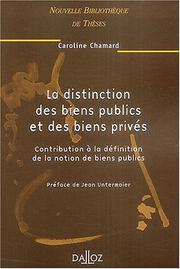| Listing 1 - 5 of 5 |
Sort by
|
Dissertation
ISBN: 2247098908 Year: 2004 Publisher: Paris : Dalloz,
Abstract | Keywords | Export | Availability | Bookmark
 Loading...
Loading...Choose an application
- Reference Manager
- EndNote
- RefWorks (Direct export to RefWorks)
Thesis (doctoral)--Université Jean-Moulin (Lyon III), 2002.
Public domain --- Public goods --- Property --- Goods, Public --- Finance, Public --- Welfare economics --- Free rider problem (Economics)

ISBN: 2247057020 9782247057023 Year: 2004 Volume: .33 Publisher: Paris: Dalloz,
Abstract | Keywords | Export | Availability | Bookmark
 Loading...
Loading...Choose an application
- Reference Manager
- EndNote
- RefWorks (Direct export to RefWorks)
Thesis (doctoral)--Universite Jean-Moulin (Lyon III), 2002
Public domain --- Public goods --- Property --- Things (Law) --- Biens collectifs --- Biens (Droit) --- Domaine public --- Goods, Public --- Finance, Public --- Welfare economics --- Free rider problem (Economics) --- Public domain - France --- Public goods - France --- Property - France

ISBN: 0521542545 0521834775 0511215428 0511217218 0511315821 0511617119 128054063X 0511211848 0511213611 1107161118 9780521834773 9780521542548 9780511217210 9780511211843 9780511213618 9780511215421 9780511617119 9786610540631 6610540632 9781107161115 9780511315824 Year: 2004 Publisher: Cambridge, U.K. ; New York : Cambridge University Press,
Abstract | Keywords | Export | Availability | Bookmark
 Loading...
Loading...Choose an application
- Reference Manager
- EndNote
- RefWorks (Direct export to RefWorks)
This book examines how nations and other key participants in the global community address problems requiring collective action. The global community has achieved some successes, such as eradicating smallpox, but other efforts to coordinate nations' actions, such as the reduction of drug trafficking, have not been sufficient. This book identifies the factors that promote or inhibit successful collective action at the regional and global level for an ever-growing set of challenges stemming from augmented cross-border flows associated with globalization. Modern principles of collective action are identified and applied to a host of global challenges, including promoting global health, providing foreign assistance, controlling rogue nations, limiting transnational terrorism, and intervening in civil wars. Because many of these concerns involve strategic interactions where choices and consequences are dependent on one's own and others' actions, the book relies, in places, on elementary game theory that is fully introduced for the uninitiated reader.
International cooperation --- Alliances --- Globalization --- Public goods --- Game theory --- Decision making --- 327.116 --- Deciding --- Decision (Psychology) --- Decision analysis --- Decision processes --- Making decisions --- Management --- Management decisions --- Choice (Psychology) --- Problem solving --- Games, Theory of --- Theory of games --- Mathematical models --- Mathematics --- Goods, Public --- Finance, Public --- Welfare economics --- Global cities --- Globalisation --- Internationalization --- International relations --- Anti-globalization movement --- Treaties of alliance --- Treaties --- Cooperation, International --- Global governance --- Institutions, International --- Interdependence of nations --- International institutions --- World order --- Cooperation --- International organization --- Law and legislation --- Business, Economy and Management --- Economics --- Free rider problem (Economics) --- International cooperation. --- Alliances. --- Globalization. --- Public goods. --- Game theory. --- Decision making.

ISBN: 0521535670 0521828775 1107713714 0511165307 9786613329103 0511165722 0511566484 0511754183 1283329107 0511163797 0511164599 Year: 2004 Publisher: Cambridge : Cambridge University Press,
Abstract | Keywords | Export | Availability | Bookmark
 Loading...
Loading...Choose an application
- Reference Manager
- EndNote
- RefWorks (Direct export to RefWorks)
A Course in Public Economics, first published in 2004, explores the central questions of whether or not markets work, and if not, what is to be done about it. The first part of the textbook, designed for upper-level undergraduates and first-year graduate students, begins with an extended discussion of the two theorems of welfare economics. These theorems show that competitive markets can give rise to socially desirable outcomes, and describe the conditions under which they do so. The second part of the book discusses the kinds of market failure - externalities, public goods, imperfect competition and asymmetric information - that arise when these conditions are not met. The role of the government in resolving market failures is examined. The limits of government action, especially those arising from asymmetric information, are also investigated. A knowledge of intermediate microeconomics and basic calculus is assumed.
Capitalism --- Economic policy --- Economics --- Public goods --- 330 --- 330.101 --- 330.1 --- 330.1 Economische grondbegrippen. Algemene begrippen in de economie --- Economische grondbegrippen. Algemene begrippen in de economie --- Goods, Public --- Finance, Public --- Welfare economics --- Free rider problem (Economics) --- Economic theory --- Political economy --- Social sciences --- Economic man --- Economic nationalism --- Economic planning --- National planning --- State planning --- Planning --- National security --- Social policy --- Market economy --- Profit --- Capital --- 330.101 Economische analyse. Economische methodologie. Economische onderzoeksmethoden--(theoretische economie) --- Economische analyse. Economische methodologie. Economische onderzoeksmethoden--(theoretische economie) --- Economics, Mathematical --- Mathematical models --- Business, Economy and Management --- Economics. --- Economic policy. --- Capitalism. --- Public goods. --- Mathematical models.
Book
ISBN: 1462306527 1452720967 1282110497 145189970X 9786613803382 Year: 2004 Publisher: Washington, D.C. : International Monetary Fund,
Abstract | Keywords | Export | Availability | Bookmark
 Loading...
Loading...Choose an application
- Reference Manager
- EndNote
- RefWorks (Direct export to RefWorks)
This paper articulates a logical foundation-drawn from disparate literatures-for understanding why safeguarding financial stability is an important economic policy objective. The paper also explains why private aspects of finance provide broader social economic benefits and have the characteristics of public goods. Unique aspects of finance are examined, as are the linkages between finance, money, and the real economy. Sources of market imperfections in finance are identified and their implications are analyzed. The arguments imply that reaping the full private and social economic benefits of finance requires both private-collective and public-policy involvement as well as a delicate balance between maximizing the benefits of positive externalities (and public goods) and minimizing the costs (including potential instabilities) of other sources of market imperfections in finance.
Finance, Public. --- Fiscal policy. --- Public goods. --- Goods, Public --- Finance, Public --- Welfare economics --- Free rider problem (Economics) --- Tax policy --- Taxation --- Economic policy --- Cameralistics --- Public finance --- Public finances --- Currency question --- Government policy --- Banks and Banking --- Finance: General --- Macroeconomics --- Industries: Financial Services --- Information and Market Efficiency --- Event Studies --- General Financial Markets: Government Policy and Regulation --- Monetary Systems --- Standards --- Regimes --- Government and the Monetary System --- Payment Systems --- Financial Markets and the Macroeconomy --- Money Supply --- Credit --- Money Multipliers --- Central Banks and Their Policies --- Incomplete Markets --- Allocative Efficiency --- Cost-Benefit Analysis --- Externalities --- Asymmetric and Private Information --- Public Goods --- Banks --- Depository Institutions --- Micro Finance Institutions --- Mortgages --- Macroeconomics: Consumption --- Saving --- Wealth --- Portfolio Choice --- Investment Decisions --- Aggregate Factor Income Distribution --- Finance --- Banking --- Financial sector stability --- Consumption --- Liquidity --- Loans --- Financial sector policy and analysis --- National accounts --- Financial institutions --- Asset and liability management --- Purchasing power --- Banks and banking --- Financial services industry --- Economics --- Income --- United States
| Listing 1 - 5 of 5 |
Sort by
|

 Search
Search Feedback
Feedback About UniCat
About UniCat  Help
Help News
News